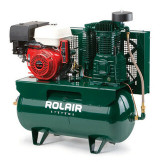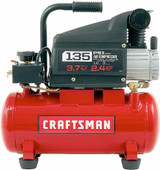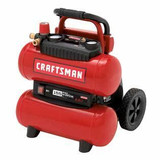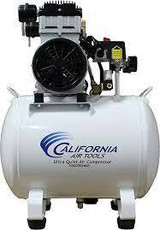Shop Air Compressors By Type
An efficiently running air compressor is the backbone of any shop, and Master Tool Repair is your destination for the parts and pumps to keep yours operating at peak performance. We offer an unbeatable selection of replacement components for seven distinct air compressor types: electric, gas, oil-free, oil-lubricated, portable, stationary, and ultra-quiet models.
Determining Your Air Compressor Needs: CFM, Tank Size, and Horsepower
What determines the best air compressor for your shop? Air tool requirements, project scope, and shop size dictate the appropriate CFM, PSI (Pounds per Square Inch), tank size, and horsepower for your pneumatic air compressor.
CFM measures airflow volume, directly impacting tool performance; higher CFM values support larger, more demanding tools. Tank size influences run time; a larger tank provides longer operation before the compressor cycles back on. This is typical for full-size shop units. Horsepower indicates the motor’s power; higher horsepower typically translates to greater CFM and PSI capabilities.
Use our handy CFM matrix to determine the right compressor for your specific tools and applications.
|
Tool |
CFM Requirement (at 90 PSI) |
|
Impact Wrench |
4-5 CFM |
|
Air Ratchet |
3-4 CFM |
|
Spray Gun (HVLP) |
6-8 CFM |
|
Sandblaster |
10-15 CFM |
|
Air Grinder |
4-6 CFM |
Electric vs. Gas-Powered Air Compressors
Which air compressor power source best suits your work environment? Electric air compressors provide clean, quiet operation, ideal for indoor shops and garages where noise and fumes are a concern. Gas-powered compressors offer portability and independence from electrical outlets, making them perfect for job sites and remote locations.
Electric compressors are further categorized by voltage (120V or 240V), with 240V models delivering higher power for demanding applications. Consider your power availability, work area, and noise tolerance when deciding between electric and gas-powered options.
- Electric Air Compressor Benefits: Quiet operation, clean air output, low maintenance
- Gas-Powered Air Compressor Benefits: Portability, power for demanding tasks, independence from electricity
Noise Levels & Air Quality
Why are noise levels and air quality crucial considerations for your shop environment? Excessive noise can create a disruptive and potentially hazardous work environment. Ultra-quiet air compressors minimize noise pollution, offering a more comfortable and productive workspace, especially for indoor use.
Oil-free compressors inherently produce cleaner air, free from oil contaminants, which is crucial for applications like painting and finishing. Air filtration systems further enhance air quality by removing dust and other particles, protecting tools, and improving finished product quality.
Matching the Air Compressor to Your Tools
What ensures optimal performance when pairing air tools with your compressor? Understanding air tool requirements, specifically CFM and PSI ratings, is essential for matching the right compressor to your toolset.
An air compressor with insufficient CFM will struggle with power-demanding tools like sandblasters or large impact wrenches. Conversely, an oversized compressor can be inefficient and costly.
Master Tool Repair provides comprehensive resources and expert advice to help you select the perfectly matched air compressor and air tools for your specific needs. Consider factors such as hose length and material, as these can impact air pressure and tool performance.
- Consider: Nail guns, impact wrenches, sandblasters, spray guns, and air ratchets – match their requirements to the air compressor’s CFM and PSI.
Key Components and Maintenance
How does proper maintenance extend the life of your air compressor? Regular maintenance ensures optimal performance and longevity. Oil-lubricated compressors require periodic oil changes to maintain lubrication and prevent wear on internal components like the pump and cylinder.
Oil-free compressors offer simplified maintenance, often requiring only occasional checks of the piston and other components. Moisture management is critical for all air compressors. Using moisture traps and dryers prevents water damage to tools and ensures clean, dry airflow. Inspecting check valves and other components regularly can prevent costly repairs.
Oil-Lubricated vs. Oil-Free Compressors:
|
Feature |
Oil-Lubricated |
Oil-Free |
|
Maintenance |
Requires regular oil changes |
Minimal maintenance |
|
Durability |
Typically more durable for heavy-duty use |
Suitable for lighter-duty and intermittent use |
|
Air Quality |
Requires moisture management |
Produces cleaner, drier air |
|
Noise Level |
Can be louder |
Generally quieter |
|
Cost |
Generally more expensive initially |
Typically less expensive initially |
Master Tool Repair: Finding the Perfect Air Compressor and Expert Support
How does Master Tool Repair help you make the right choice? We offer a wide selection of air compressor brands and models, catering to both DIY enthusiasts and industrial professionals. Our expert team can provide personalized guidance based on your specific shop requirements, ensuring you choose the right air compressor for your needs and budget.
We also carry a comprehensive inventory of air compressor parts, including pumps, hoses, fittings, and more, ensuring you can maintain and repair your equipment for optimal performance.
Explore our selection and discover the ideal air compressor solution for your shop with Master Tool Repair.







